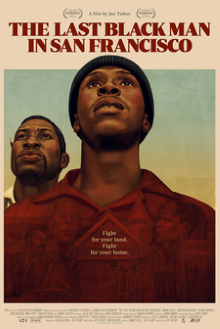
There is a kind of chilling resonance watching this amidst the coranavirus lockdown as the opening scene features someone in full hazmat protective gear and a doomsday sayer ranting on a soapbox. Still that’s not what this film is about though its message about gentrification and isolation amidst a rapidly changing city does have some thematic commonalities with our current crisis.
San Francisco native Jimmy Fails currently lives in his best friend Mont’s house but is obsessed with regaining his old family home that he grew up in. The house in question is a stately Victorian mansion in a district that is now populated mainly by rich people and that Jimmy believes was built by his grandfather in the 1940s. However Jimmy’s father lost the house some time ago and currently an elderly white couple occupies it. When they are out, Jimmy have a habit of sneaking in to perform maintenance on it, such as painting the window sills to be the exact same color as he remembered them. One day the two of them see the couple moving on, apparently due to an inheritance dispute. Jimmy breaks into the empty house and soon enough they take to occupying it illegally. Meanwhile Mont who is something of a playwright tries to befriend a group of men who hangs out outside his house and invites one in particular to visit Jimmy’s house. When this friend is later killed in a fight, he decides to write and stage a one-man show about it in the house.
Given the premise, one can easily imagine a very conventional arc for how it would go. It would involve evil capitalists, the plucky little guy standing up to investors who don’t even live in the house and end, somehow, with justice for the little guy. The Last Black Man in San Francisco does not follow this arc and that is why it is both so interesting and so difficult to make out what the director is trying to say. Jimmy’s abiding love for the house is endearing but the film also suggests that it’s time for him to let go of the house and move on with his life as the other members of his family have done. Similarly while there is indeed a slimey real estate agent in this film, it’s not clear that the elderly couple is less deserving of living in the house than Jimmy himself. Then there is Mont’s play and the death of their friend Kofi. The message there is that no man is just one thing and that there are layers of complexities in everyone. This of course applies to Jimmy as well as it turns out that part of his obsession with the house grew out of a fantasy. That’s just so much going on in here.
Arguably the film is trying to do too much, which rather diffuses what it’s trying to say. This may be because this seems to be partly based on a real story as actor Jimmie Fails plays a fictionalized version of himself as he and director Joe Talbot are childhood friends who have always wanted to tell this story. That’s enviable but it also explains why the ending seems to pivot to be mostly about their friendship, a markedly different direction from what the rest of the film seemed to be working up towards. At the same time, they also try hard to invoke what they call the spirit of San Francisco but I had difficulty grasping what they actually mean by it and what gives the city its unique qualities. This is probably another case in which the people actually know the city have a better emotional connection with what the film is doing but it does very little for me.
I do concede that this is a very interesting film and the filmmakers have to be commended for not taking the easy route but this won’t be making it onto my list of favorites.